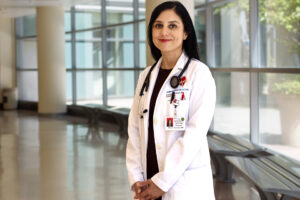The holiday season is a time to celebrate life and our connection to family and friends.
But it’s also a time to remember to take heart attack warning signs seriously and to keep in mind that holiday-making behaviors — eating more than normal, staying up late, and drinking a lot — can cause serious health problems, or even death.
“We definitely see more heart attacks, more congestive heart failure exacerbations, and more heart arrhythmias over Thanksgiving, Christmas, and New Year’s,” said Kaiser Permanente Santa Clara cardiologist Seema Pursnani, MD.

More cardiac-related deaths occur nationwide on December 25 than on any other day of the year, followed by December 26 and January 1, according to a 2004 study published in Circulation, a journal of the American Heart Association.
“One of the big reasons people suffer from severe cardiac events during the holidays is they diminish heart-related symptoms they are having and don’t seek care as fast as they should,” said Dr. Pursnani. “They may feel too busy with holiday events to pay attention to what they are feeling, or they don’t want to ruin a holiday for others with a visit to the emergency room.”
Holidays can push a heart too far
Typically, a heart attack is caused by plaque — cholesterol and fats — in the coronary arteries that ruptures and blocks blood flow to the heart muscle. The plaque builds up over years, Dr. Pursnani explained.
“It’s not that a person having a heart attack had a sudden plaque buildup during the holidays, but a change in lifestyle such as overeating, increased stress, skipping doses of heart medicine, or even lack of sleep can incite the plaque that is already there to rupture,” she said.
An 81-year-old Kaiser Permanente member who underwent emergency triple coronary artery bypass surgery in 1996 when he was in his early 50s, will take care this holiday season.
He won’t overeat or skip his heart medicine. And he’ll manage his stress and maintain his 6-day a week, 30-minute exercise routine. He credits those kinds of disciplined lifestyle habits with keeping him alive in the 27 years since he lost consciousness while visiting his wife in the hospital and was told he needed surgery the very same day.
“I had a very good Kaiser cardiologist who said, ‘If you exercise and have a proper diet and medication, you will have a full life,’” recalled the member, whose name was withheld for patient confidentiality reasons. “I took her upon her word and did exactly as she said.”
His advice for people with heart issues? “Become extremely disciplined with a balanced diet that is low in saturated fats or animal fats, exercise regularly, and take your medication.”
“One of the big reasons people suffer from severe cardiac events during the holidays is they diminish heart-related symptoms they are having and don’t seek care as fast as they should.” Seema Pursnani, MD.
If you are unsure about what to eat for a healthy heart, access Kaiser Permanente health coaches or ask your doctor about connecting with a dietitian. Dr. Pursnani recommends eating a whole-food, plant-based diet that can help lower the risk of cardiovascular disease.
Maintain healthy habits
Dr. Pursnani said people with congestive heart failure should pay extra attention during the holidays.
“With people who have congestive heart failure, excessive salt intake can trigger an exacerbation with fluid buildup in the lungs and other parts of the body,” said Dr. Pursnani. “Again, this is an example of the lifestyle changes that happen during the holidays that people should be aware of. They may eat more unhealthy foods, like those that are higher in sodium, more processed or refined, or more desserts than they usually do.”
Drinking alcohol is a way to celebrate, and for some, a way to cut the stress that inevitably crops up during the holidays. But that can cause heart problems, too.
“There is actually something called the holiday heart syndrome, and that is an irregular and fast heartbeat, known as atrial fibrillation, caused by binge drinking that can cause palpitations, dizziness or even passing out,” said Dr. Pursnani. “It can even happen to people who rarely drink alcohol.”
While not generally considered to be fatal, it can increase the risk of blood clots or stroke, added Dr. Pursnani.
“Heart related symptoms around the holidays are important to be aware of,” she said. “A lot of people liberalize things during the holidays, and some are more susceptible to cardiac events than others.”





This Post Has 0 Comments